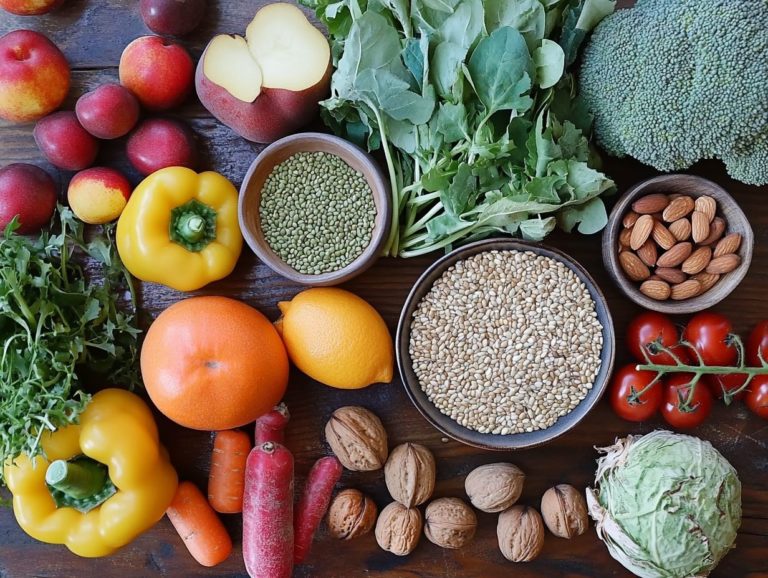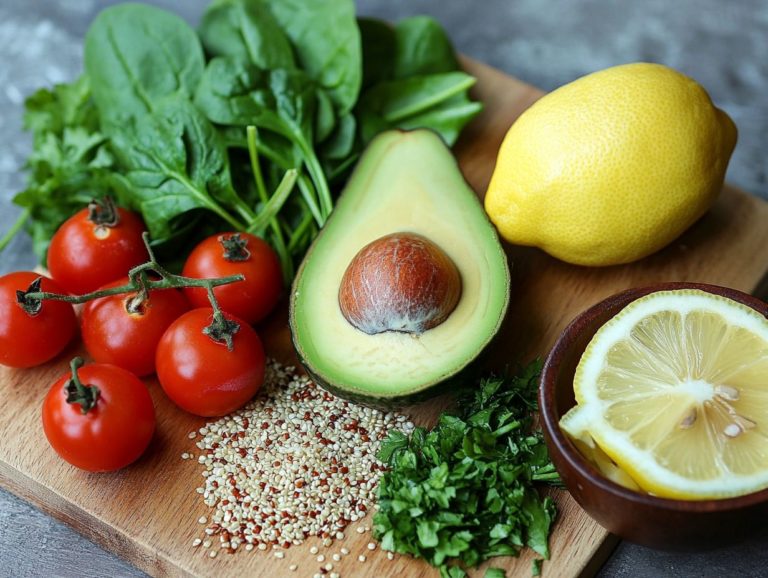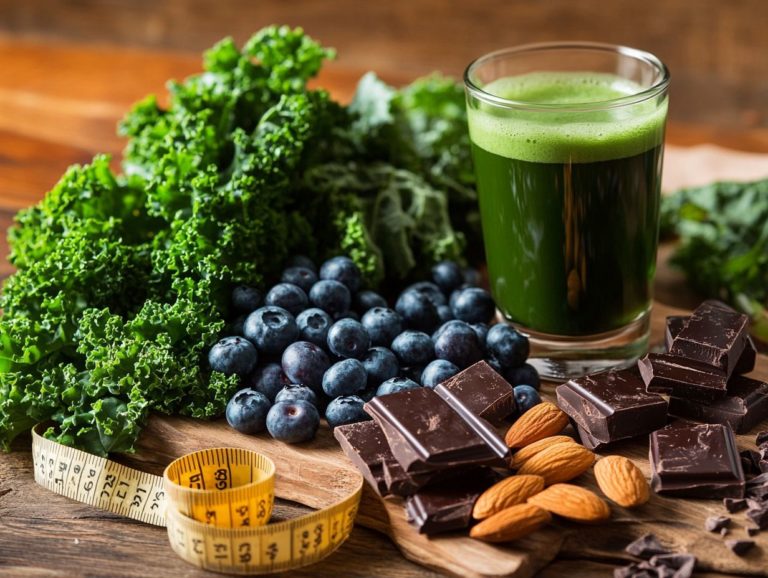Understanding the Benefits of an Alkaline Diet
Are you intrigued by the impact of your food choices on your body s pH levels? Imagine transforming your health just by changing what s on your plate! An alkaline diet can be your key to feeling vibrant and energetic.
An alkaline diet emphasizes the importance of achieving a harmonious balance between acidic and alkaline foods to enhance your overall health.
This article delves into the essential principles of an alkaline diet, highlighting its myriad benefits, including improved digestion and reduced inflammation.
You ll find guidance on adopting this lifestyle, insightful meal planning tips, and strategies to help you remain consistent in your pursuit of better health.
Explore how straightforward dietary adjustments can unlock transformative health benefits for you!
Contents
- Key Takeaways:
- What is an Alkaline Diet?
- Benefits of an Alkaline Diet
- How to Follow an Alkaline Diet
- Tips for Maintaining an Alkaline Diet
- Frequently Asked Questions
- What is an alkaline diet?
- What are the benefits of following an alkaline diet?
- How does an alkaline diet affect the body’s pH level?
- Are there any specific foods that should be included in an alkaline diet?
- Can an alkaline diet benefit those with certain health conditions?
- Is it necessary to completely eliminate acidic foods from the diet when following an alkaline diet?
Key Takeaways:

- An alkaline diet helps maintain pH balance in your body.
- Eating more alkaline foods like fruits and vegetables may improve digestion.
- You can reduce the risk of chronic diseases by making simple dietary changes.
What is an Alkaline Diet?
An alkaline diet centers around achieving a harmonious balance in your body’s pH levels. It promotes the intake of alkaline-producing foods while minimizing those that create acidity.
This dietary approach includes fresh fruits, vegetables, legumes, and whole grains. These foods are known for their health benefits, such as better digestion and a lower risk of cancer.
By embracing this way of eating, you have the potential to prevent long-term health issues while effectively meeting your nutritional needs through wholesome food choices.
Explanation of pH and Acidic vs. Alkaline Foods
The pH scale is your guide to understanding how acidic or alkaline a substance is, ranging from 0 to 14. Values below 7 signify acidity, while those above 7 indicate alkalinity this plays a significant role in your dietary habits.
Grasping this scale is vital, particularly when you consider the alkaline diet, which advocates for foods that elevate your body’s pH. Acidic foods, such as processed meats and sugary snacks, can bring about a host of health issues, including inflammation and fatigue.
On the flip side, alkaline foods like leafy greens and most fruits not only help maintain an optimal pH but also deliver essential nutrients that bolster your overall health.
Take spinach and cucumbers, for instance; they re alkaline and can do wonders for your body. In contrast, cranberries and prunes lean toward the acidic side. By striking a balance between these food groups, you have the potential to enhance your wellness and ward off chronic illnesses.
Benefits of an Alkaline Diet
Embracing an alkaline diet brings a wealth of health benefits your way. You’ll experience improved digestion, enhanced immune function, and reduced inflammation.
This dietary approach may also lower your risks of chronic diseases like cancer and diabetes, making it a truly valuable option for many individuals seeking a healthier lifestyle.
Improved Digestion and Immune System
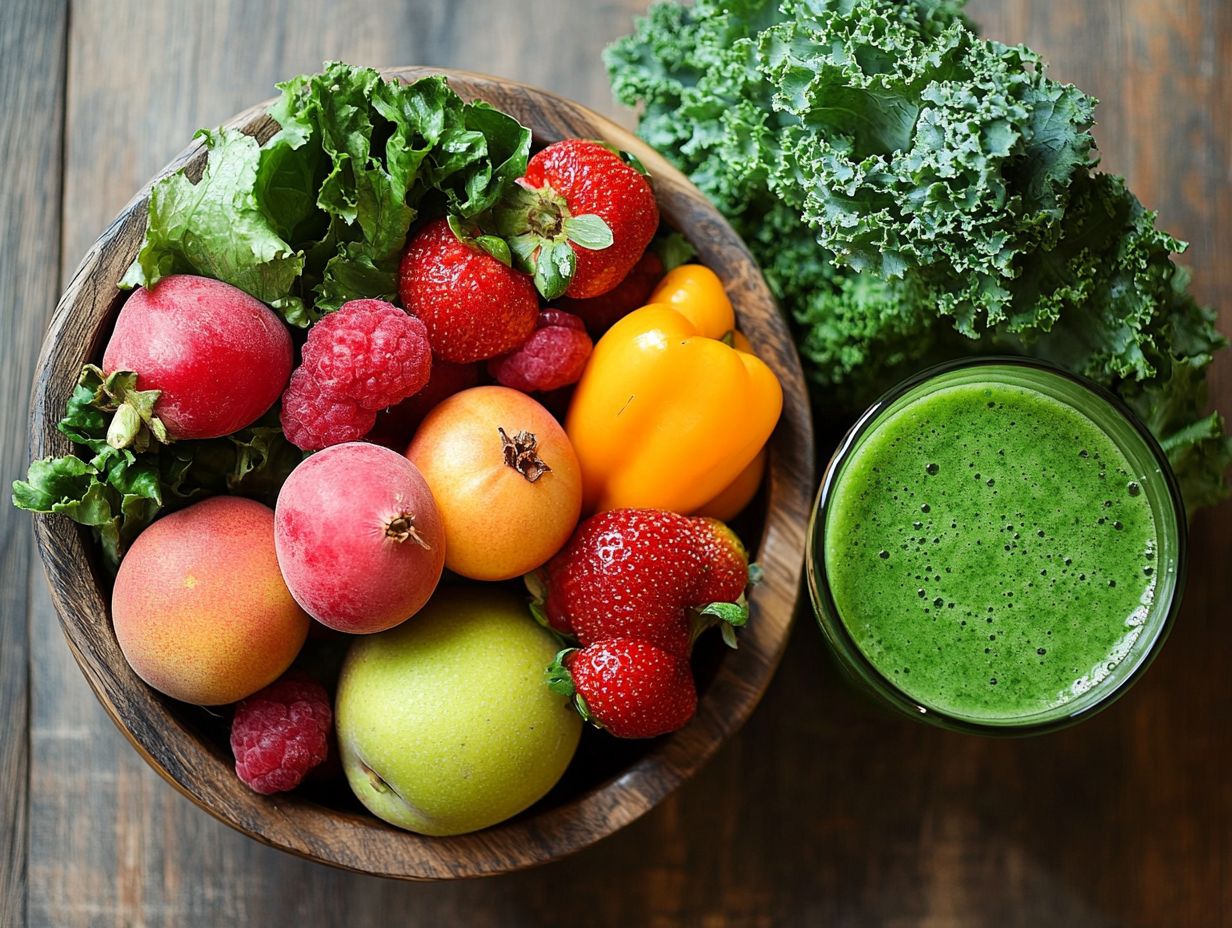
An alkaline diet can truly elevate your digestive health and fortify your immune system by encouraging the consumption of dietary fiber from whole foods, fresh fruits, and vegetables.
This approach not only helps balance your body’s pH levels but also fosters the growth of beneficial gut bacteria, which are essential for nutrient absorption and overall well-being.
Foods like avocados, leafy greens, and almonds are packed with vital vitamins and minerals that further enhance your immune function. The antioxidants present in these alkaline foods work wonders in reducing inflammation, while the array of fibers promotes regular bowel movements and helps prevent digestive discomfort.
In essence, weaving these nutrient-dense options into your daily meals serves as a holistic strategy for maintaining optimal digestive and immune health.
Ready to revamp your diet? Start exploring delicious alkaline recipes today!
Reduced Inflammation and Chronic Disease Risks
Research indicates that embracing an alkaline diet can significantly reduce inflammation in your body, potentially lowering your risk for chronic conditions such as cancer, diabetes, and kidney disease.
This connection between what you eat and inflammation is increasingly backed by scientific evidence. For example, a study published in the Journal of Nutrition revealed that individuals following an alkaline diet had notably lower levels of inflammatory markers compared to those following a typical Western diet.
Nutrition experts often stress that incorporating fruits, vegetables, and whole grains essential components of an alkaline diet can boost your body’s ability to combat harmful substances that can damage your body.
Health professionals report instances where patients have shared improved health outcomes, including better management of chronic diseases and enhanced overall vitality, simply by making more alkaline food choices.
How to Follow an Alkaline Diet
Adopting an alkaline diet requires a deliberate commitment to incorporating a diverse array of alkaline foods.
At the same time, you should consciously steer clear of acid-forming options. By aligning your dietary choices with established guidelines, you pave the way for optimal health outcomes.
Foods to Include and Avoid
When you embark on an alkaline diet, it s vital to embrace alkaline foods like fresh fruits, vegetables, legumes, and whole grains.
At the same time, steer clear of acid-forming foods such as processed items, animal proteins, and sugary snacks.
Incorporating a variety of leafy greens, like spinach and kale, can be particularly beneficial due to their high mineral content and their remarkable ability to support your overall metabolic function.
Have you tried incorporating more leafy greens into your meals? They can greatly benefit your health! Surprisingly, fruits like lemons and avocados, while appearing acidic, transform into alkaline-rich foods once metabolized, offering a treasure trove of vitamins that can enhance your immunity.
Make it a priority to limit your intake of acidic beverages and refined grains, as these can disturb the delicate pH balance your body craves.
By thoughtfully balancing your food groups and pairing alkaline foods with healthy fats such as nuts and seeds you ll effectively meet your nutrient needs while promoting optimal health.
Tips for Maintaining an Alkaline Diet

Maintaining an alkaline diet demands your commitment and mindfulness, especially when it comes to cooking meals and preparing food.
It’s essential to make informed dietary choices that support your health goals while thoughtfully considering any health claims associated with restrictive diets.
Incorporating Alkaline Foods into Daily Meals
Incorporating alkaline foods into your daily meals can be remarkably straightforward. Imagine adding a vibrant vegetable stir fry brimming with fresh vegetables and legumes, effortlessly fulfilling your nutrient needs.
By including an array of colorful veggies like bell peppers, kale, and broccoli, you create a feast for the eyes and nourish your body.
To elevate this stir fry, think about adding legumes such as lentils and chickpeas, which serve as excellent sources of protein.
You might also explore hearty salads featuring spinach, avocados, and a sprinkle of nuts for that delightful crunch. To keep your meals exciting, don t hesitate to experiment with spices like turmeric or ginger, which enhance flavor while providing additional nutritional benefits.
Meal prepping can seamlessly integrate these alkaline options into your routine. Consider batch cooking quinoa or brown rice and storing it in your fridge for quick access during busy weekdays.
This way, healthy meals transform into a convenient yet delicious experience, aligning perfectly with your dietary goals while keeping your palate thoroughly satisfied.
Don’t wait! Start making healthier food choices today for a happier, healthier you.
Staying Consistent and Avoiding Pitfalls
To maintain consistency with an alkaline diet, be mindful of common pitfalls. These include food limitations that can lead to nutritional deficiencies and health risks from poor food choices.
Navigating these challenges may feel overwhelming, but understanding effective strategies can significantly enhance your commitment to this lifestyle. One key tactic is meal planning! You can avoid convenience foods that disrupt your alkaline balance by preparing nutrient-rich dishes in advance.
Incorporating a variety of alkaline foods like leafy greens, avocados, and nuts lets you enjoy diverse flavors. These foods also ensure you re getting essential nutrients.
Stay informed about the alkaline properties of foods! This knowledge empowers you to make educated choices, and seeking support from community groups or online forums can provide a motivational boost and keep you accountable.
Frequently Asked Questions
What is an alkaline diet?
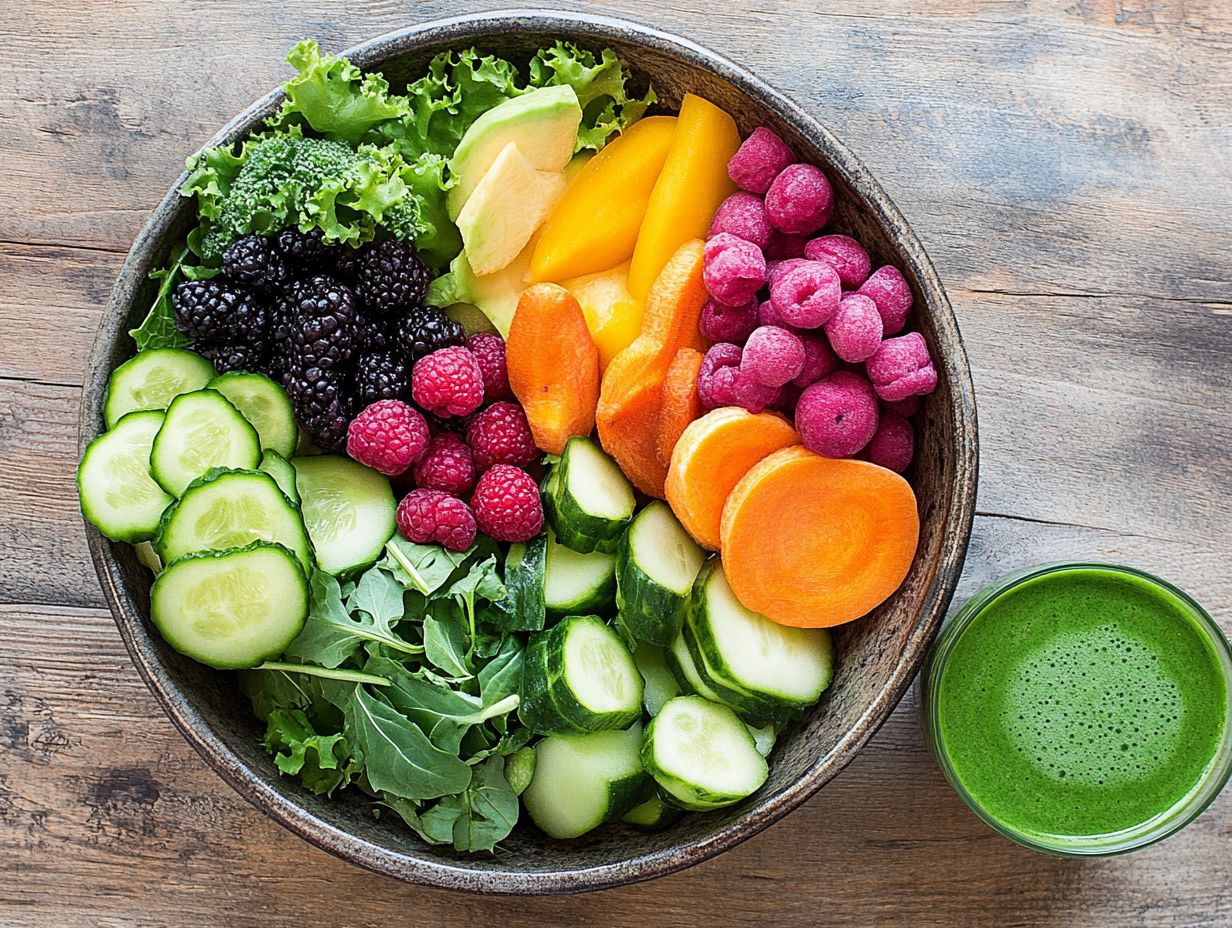
An alkaline diet refers to a way of eating that focuses on consuming foods with a higher pH level, promoting a less acidic environment in the body. This type of diet typically includes plenty of fruits, vegetables, and plant-based proteins.
What are the benefits of following an alkaline diet?
There are several potential benefits associated with an alkaline diet, including improved digestion, increased energy levels, reduced inflammation, and better overall health. It may also help to prevent chronic diseases such as heart disease and cancer.
How does an alkaline diet affect the body’s pH level?
The foods consumed in an alkaline diet help to balance the body’s pH level by reducing the amount of acid-producing foods and increasing the intake of alkaline foods. This can help to maintain a slightly alkaline pH level, which is considered optimal for overall health.
Are there any specific foods that should be included in an alkaline diet?
Yes, an alkaline diet typically includes plenty of fruits, vegetables, whole grains, and plant-based proteins such as beans, legumes, and nuts. It also encourages the consumption of alkaline water, herbal teas, and certain types of oils such as olive oil and coconut oil.
Can an alkaline diet benefit those with certain health conditions?
While more research is needed, some studies have shown that following an alkaline diet may benefit those with certain health conditions such as acid reflux, kidney disease, and osteoporosis. However, it is always best to consult with a healthcare professional before making any dietary changes.
Is it necessary to completely eliminate acidic foods from the diet when following an alkaline diet?
No, the goal of an alkaline diet is not to completely eliminate acidic foods, but rather to find a balance between acidic and alkaline foods. It is still important to consume a variety of nutrient-dense foods, including some acidic ones, for overall health and wellness.


